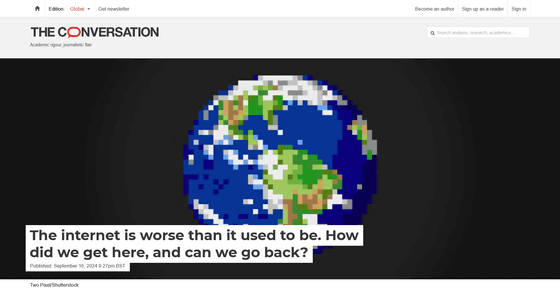Why is the internet getting worse and worse, and is there a way to bring it back to its good old days?

Mark Chan, a senior lecturer in information systems at the University of Melbourne's School of Computing and Information Systems, and Associate Professor Wonsoon Shin, a media and communications scholar at the University of Melbourne, explain the opinion that 'the Internet these days is not as fun as it used to be.'
The internet is worse than it used to be. How did we get here, and can we go back?
https://theconversation.com/the-internet-is-worse-than-it-used-to-be-how-did-we-get-here-and-can-we-go-back-236513

Access to the Internet has given us instant access to a variety of information and made it easy to communicate with strangers in distant places. The Internet once began as a free and equal space where knowledge could be shared, creativity could be unleashed, and diverse perspectives could be exchanged, according to Chan and his colleagues.
As the joke 'No one knows you're a dog on the Internet' suggests, the Internet used to be highly anonymous and it was relatively easy to protect personal information. However, over time, it has become overly commercialized, with financial motives dominating much of the content and prioritizing topicality over the quality of information.
For example, tech giants such as Google and Meta use sophisticated tracking technology and opaque algorithms to generate targeted content from personal information. This has led to the creation of filter bubbles and echo chambers, creating a situation in which users are only exposed to content that represents a limited perspective. Furthermore, the development of AI has led to the generation of a large amount of low-quality content and misleading information, further exacerbating this trend.
When I think about how the old, good internet turned into the #enshitternet , I imagine a series of small compromises, each seemingly reasonable at the time, each contributing to a cultural norm of making good things worse, and worse, and worse.
— Cory Doctorow NONCONSENSUAL BLUE TICK (@doctorow) October 3, 2023
1/ pic.twitter.com/MfHrq6PQFr
On the other hand, Chang and Associate Professor Shin point out that characteristics of the 'Internet in its better days' were its spirit of knowledge sharing, creativity, and its role as a place to encounter diverse perspectives, and they emphasize the importance of preserving these values.
As a solution to the deterioration of the Internet, Chan and Shin suggest that users take action on their own initiative. For example, they argued that change can be brought about by moving away from problematic platforms or choosing alternative services, and that a shift to a decentralized system and the dismantling of monopoly companies can lead to the creation of a healthier Internet environment.
Chang and Shin say that an essential element of privacy is 'the ability to control who can see and use information about you.' In particular, they argue that users should at least be able to control how their personal information is used by major technology companies for potential profits. At the same time, they stress the importance of users remaining vigilant about their own privacy, and that it is necessary to educate children and the elderly, who are most exposed to online threats, about the potential dangers of the Internet.

'The internet is not optimized for the best interests of its users,' Chang and Shin said, arguing that ultimately it is up to users to decide how much power they want to give to the big tech companies.
Related Posts:
in Note, Posted by log1i_yk







